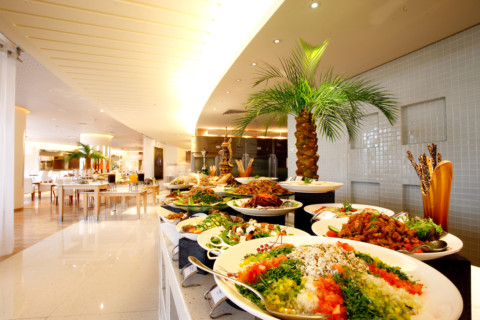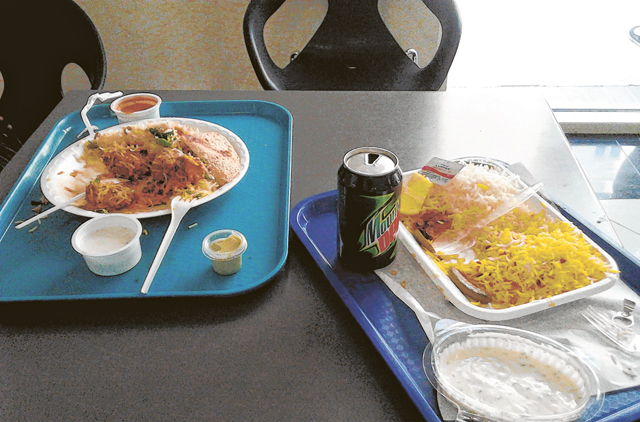It all began with the ‘caffè sospeso’ (suspended coffee) initiative nearly a 100 years ago in Naples, Italy.
Customers of coffee shops would pay twice for one espresso, instructing the barista to record the extra amount. Paid items would then remain in the log book until someone less fortunate would come into the café and ask after something to drink. They would then be served coffee for free.
The campaign is based entirely on goodwill, from start to end, with donors usually never even meeting the beneficiaries.
The initiative went global recently, with Starbucks adopting the campaign in the UK and Good Samaritans in Singapore launching a Facebook page called ‘Chope Food fo the Needy - Suspended Food Revolution’.
The Singaporean spin is to ‘chope’, or reserve meals, at hawker stalls around the city. The concept has been embraced by hundreds of corner-street coffee shops around the world, according to the broadcasting channel BBC.
Readers respond to the idea of a suspended food and its viability for large-scale acceptance:
Caroline Paul Kanjookaran: supports
Indian, 25 years, public relations, Dubai, in the UAE for 2 years
The idea of a Suspended Food campaign sounds good. It means I can make a difference on a personal level without having to get involved in something at a large scale. You can make a difference at a very small level. I would definitely participate in it. It should work but would need awareness.
Ahad Khalid: supports
Pakistani, 25 years, insurance sector, Dubai, in the UAE for 10 years
The campaign idea would work but it is dependent on the level of transparency, especially the organisations that are taking care of it. As it is a voluntary idea, I would suggest that a small fixed amount be decided upon, so that it is easier for people [to contribute] on a regular level.
Ahmad Obaid Al Tayer: supports
Emirati, 34 years, retail industry, Dubai
It might work based on the organisations involved - there has to be an element of trust. When I receive a call for charity, I would first research to validate the organisation and to see if it is backed by the government because I trust my government and I know it will reach the needy people. So, if there is a public pledge, I think the idea would work.
Nirmal Devasurendra: supports
Sri Lankan, 32 years, food and hygiene sector, Dubai, in the UAE since 30 years
This is a very good plan. The only thing is that the process should be monitored by the authorities to ensure the food is being given to the needy. If there’s a tracking system, the hotels and restaurants could provide food on a monthly basis rather than a yearly one. I would definitely participate in such initiatives!
Taimoor Nawaz: supports
Pakistani, 29 years, service sector, Dubai, in the UAE for over 15 years
It would be really nice to have this campaign implemented here. If people are aware about the initiative, what it’s about and where the food is going, I’m sure they would love to contribute, especially as a lot of people eat out in the UAE.
Rowena Luna: supports
Filipina, 36 years, public administrator, Abu Dhabi, in the UAE since 4 years
I think this is a great idea. People in the UAE are overall quite generous and do spend at restaurants, so I think they will be likely to pay for a meal for the less fortunate. The only obstacle is that they may be hesitant. They need to be sure their donation is actually going to help the needy and not to the restaurant.
Gagandeep Sahni: doubtful of success
Indian, 28 years, food distribution business, Dubai, in the UAE since 10 years
I am doubtful about the functionality of suspended food at the restaurants being distributed as charity in the UAE. If a restaurant directly approached me asking me to pay for two meals I would be doubtful about where my money was going. But on the other hand, if this campaign is launched as an initiative by Gulf News in association with some restaurants and is well marketed, people are more likely to pay for the extra meal. In other words people look for credible organisations running charity campaigns to contribute.
If the suspended food concept is worked with food manufacturing or distribution companies, it might work .... A food distribution company that wishes to contribute can directly participate in donating products or can contribute by facilitating orders and logistics on behalf of the people who wish to donate. For example, if donors want to deliver 100kg apples, they connect with the distribution company shortlisted by Gulf News and pay the cost of the items and the company manages the purchase, transportation and delivery with no added cost. Connecting charity organisations with reputed food companies ... would be a more practical approach towards the suspended food campaign.
Taaha Tahir Ahmad: doubtful of success
Pakistani, 24 years, Freelance Art Director, in the UAE since 22 years
This is a beautiful way of contributing towards the community. But its success in the UAE is doubtful for two reasons. Firstly I strongly believe that the only people who would be willing to pay twice the sum for their meal would be those who have seen and experienced poverty around them.
Secondly, most restaurants are expensive, on average I spend about Dh100 on a good meal. I am not sure if people would be willing to donate that large a sum. Instead if restaurants have food packages, say about Dh20, the suspended food idea would be more successful. If while paying the bill the customer is asked to pay an extra Dh20 for a food package for the poor, most would agree.
Majeed K. M.: supports
Indian, 63 years, legal sector, in the UAE since 18 years
I think this is a great idea and would be successful in the UAE. If a restaurant approaches me with this idea I would be more than happy to pay for two meals, if I am sure that the meal is going to charity. I don’t really have a trust issue because if the restaurant is reputable I don’t think they will lie about sending food to those in need. This is a good cause and only restaurant owners with a good heart would put forward this option to customers.
By Prerna Sethi, Reader Interactivity Journalist; Sanya Nayeem; Deputy Readers Editor, and Anupa Kurian, Readers Editor












